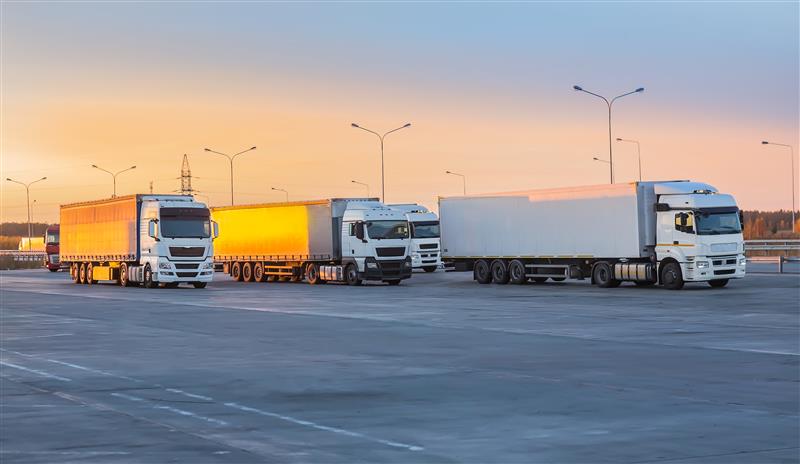
Guest
Czy ciężarówki mogą jeździć w Europie w niedziele?
Utworzony: 23.12.2024
•
Aktualizacja: 23.12.2024
Radzenie sobie z niedzielnymi zakazami prowadzenia pojazdów ciężarowych w Europie wymaga kompleksowego zrozumienia przepisów obowiązujących w poszczególnych krajach, zmian sezonowych i skutecznych strategii. Inwestując w dokładne planowanie tras, będąc na bieżąco, optymalizując operacje i wykorzystując technologię, firmy flotowe mogą złagodzić wpływ tych ograniczeń.
Na tym blogu przedstawiamy różne zasady obowiązujące w różnych krajach europejskich i analizujemy najlepsze sposoby dostosowania się do nich.
Przepisy obowiązujące w danym kraju
Każdy kraj ma własne przepisy dotyczące zakazu prowadzenia pojazdów w niedziele, które mogą się znacznie różnić.
Niemcy
Od 12:00 do 22:00 ostatniego dnia tygodnia ciężarówki o masie przekraczającej 7,5 tony nie mogą jeździć. Nie musi to jednak odstraszać. Operacje transportu kombinowanego mogą korzystać ze specjalnych uprawnień, przy czym transport kolejowy i drogowy jest dozwolony w promieniu 200 kilometrów od stacji załadunku lub rozładunku, a transport portowy lub drogowy jest dozwolony w promieniu 150 kilometrów od portów. Zwolniony z podatku jest również transport określonych łatwo psujących się towarów, takich jak świeże mleko, produkty mleczne, mięso, ryby, owoce i warzywa.
Ponadto niektóre pojazdy i operacje nie podlegają zakazowi, takie jak pojazdy ratunkowe zaangażowane w usługi odzyskiwania, holowania lub awarii.
Francja
Na tym terytorium ograniczenia jazdy są podobne do tych w Niemczech i dotyczą ciężarówek o masie przekraczającej 7,5 tony. Embarga te obowiązują w niedziele i święta od 12:00 do 22:00.
Ponadto istnieją ograniczenia w soboty i dzień przed świętami państwowymi, z zakazem prowadzenia pojazdów od 22:00 do 12:00. A w okresie letnim w określone soboty obowiązują zakazy od 7 rano do 7 wieczorem.
Istnieją wyjątki dla niektórych towarów, w tym produktów mlecznych i mięsnych, a także pojazdów ratunkowych. Naruszenie tych zakazów może prowadzić do znacznych grzywien, wynoszących od 750 do 3750 euro, odpowiednio dla osób fizycznych i firm.
Włochy
Ciężarówki nie mogą wyjeżdżać na drogi w niedziele i święta od 9 rano do 10 wieczorem we Włoszech. Warto zauważyć, że w czerwcu, lipcu, sierpniu i wrześniu embargo zaczyna się wcześniej o 7 rano - choć nadal kończy się o 22.
Kraj nakłada również dodatkowe ograniczenia w miesiącach letnich. W lipcu embargo obowiązuje w soboty od 8:00 do 16:00, a w sierpniu od 8:00 do 22:00.
Chociaż są to ogólne zasady, ważne jest, aby wiedzieć, że mogą istnieć lokalne różnice lub tymczasowe ograniczenia na niektórych trasach. Podobnie jak w przypadku Francji i Niemiec, niektóre wyjątki mogą mieć również zastosowanie do określonych rodzajów towarów lub usług ratunkowych.
Hiszpania
Jeśli chodzi o Hiszpanię, jest to znacznie bardziej złożony scenariusz. Istnieje mozaika zakazów regionalnych, szczególnie w Katalonii. Ograniczenia jazdy dla ciężarówek mogą się zmieniać w zależności od lokalnych przepisów, świąt państwowych i określonych tras. Kierowcy ciężarówek działający w tym kraju powinni zapoznać się z lokalnymi wytycznymi, aby zapewnić zgodność.
Oprócz zakazów dotyczących niedziel i świąt, istnieją również ograniczenia dotyczące niektórych sobót w miesiącach letnich. Zazwyczaj obowiązują one w godzinach od 8:00 do 12:00, szczególnie w lipcu i sierpniu, kiedy ruch jest większy ze względu na urlopowiczów.
Inne kraje
Jeśli chodzi o inne kraje europejskie, wiele z nich również egzekwuje własne zakazy jazdy w niedziele. Austria, na przykład, nakazuje, aby ciężarówki ważące ponad 7,5 tony nie mogły poruszać się po drogach w niedziele od 12 rano do 22 wieczorem. Szwajcaria utrzymuje coś podobnego, a pojazdy przekraczające 3,5 tony nie mogą jeździć przez cały dzień.

Strategie dla firm flotowych
Aby poradzić sobie z niedzielnymi ograniczeniami w prowadzeniu ciężarówek, kluczowe jest skuteczne planowanie tras. Wykorzystując zaawansowaną technologię i strategiczne myślenie, operatorzy flot mogą zoptymalizować swoje procesy.
Wykorzystanie GPS i oprogramowania do planowania tras
Wykorzystanie nowoczesnych systemów GPS i oprogramowania do planowania tras umożliwia flotom i ich kierowcom określenie najbardziej efektywnych tras przy jednoczesnym unikaniu obszarów objętych zakazem prowadzenia pojazdów. Narzędzia te mogą dostarczać aktualizowane w czasie rzeczywistym informacje o warunkach drogowych, zapewniając kierowcom ciężarówek możliwość podejmowania świadomych decyzji w drodze.
Rozważ alternatywne trasy
Innym pomysłem jest zbadanie różnych sposobów dotarcia do danego miejsca. Chociaż kuszące może być trzymanie się najbardziej bezpośredniej drogi, alternatywne trasy często pozwalają zaoszczędzić czas i uniknąć potencjalnych kar. Takie objazdy mogą być nieco dłuższe, ale mogą pomóc ominąć obszary z rygorystycznymi embargami, umożliwiając płynniejsze operacje.
Planowanie opóźnień
Biorąc pod uwagę możliwość wystąpienia opóźnień spowodowanych przez korki lub embarga na przejazdy, rozsądne jest, aby firmy flotowe przewidziały dodatkowy czas w swoich harmonogramach. Proaktywne podejście zapewnia lepsze możliwości terminowych dostaw - nawet w obliczu nieoczekiwanych wyzwań.
Bądź na bieżąco
Bycie na bieżąco z przepisami i warunkami drogowymi w czasie rzeczywistym jest równie ważne. Dlatego warto korzystać ze specjalnych aplikacji i stron internetowych - zapewniają one kierowcom ciężarówek aktualne informacje o zamknięciach dróg, wypadkach i korkach, umożliwiając im dostosowanie tras i uniknięcie opóźnień.
Wiele stowarzyszeń transportowych i dostawców usług logistycznych oferuje usługi subskrypcji alertów drogowych. Zapisując się do tych powiadomień, operatorzy flot mogą otrzymywać informacje o wszelkich zmianach w przepisach ruchu drogowego, zapewniając ich przestrzeganie.
Wykorzystanie technologii
Wykorzystanie technologii może zwiększyć wydajność operacyjną i zgodność z [przepisami dotyczącymi czasu jazdy] (https://snapacc.com/newsroom/drivers-working-time-directive-a-guide-for-truck-drivers/).
Systemy telematyczne umożliwiają firmom flotowym monitorowanie lokalizacji pojazdów, zużycia paliwa i zachowania kierowców. Dane te mogą być nieocenione przy optymalizacji tras. Co więcej, prowadzenie cyfrowych dzienników upraszcza prowadzenie dokumentacji, która będzie niezbędna w przypadku audytu.
Równie ważna jest technologia upraszczająca płatności - i właśnie w tym może pomóc SNAP.
Zarejestruj się w SNAP
Niezależnie od tego, czy szukasz bezpiecznego parkingu, myjni dla ciężarówek, czy innych usług dla swojej floty, nasze rozwiązania sprawiają, że płacenie za nie jest znacznie wygodniejsze. Sprawdź już dziś, co może Ci zaoferować SNAP .


